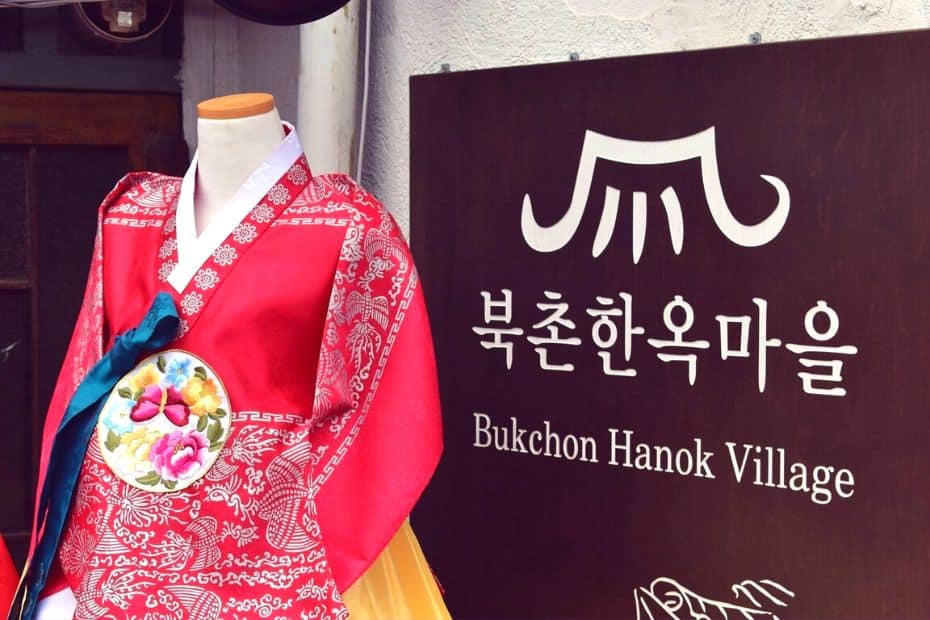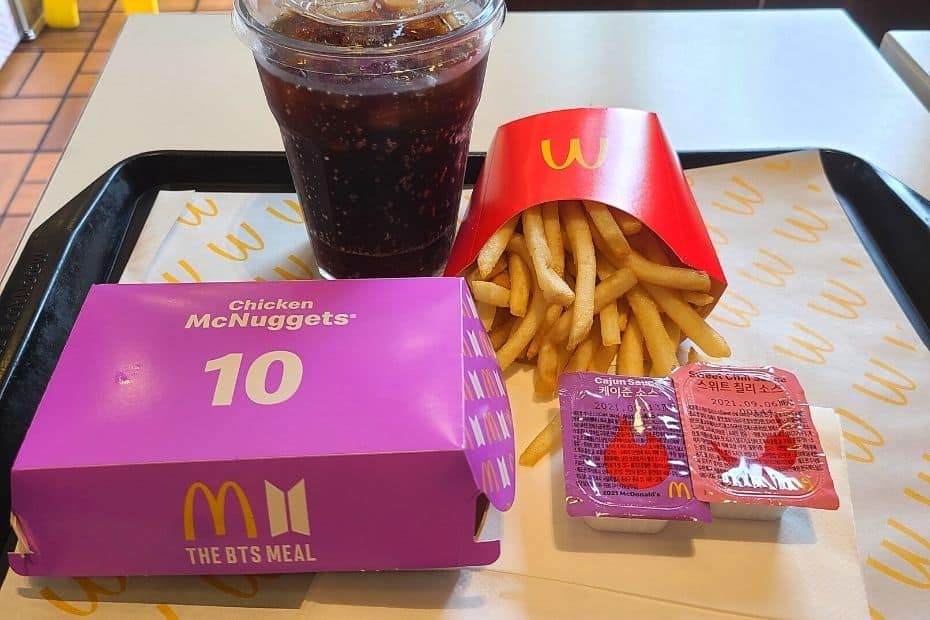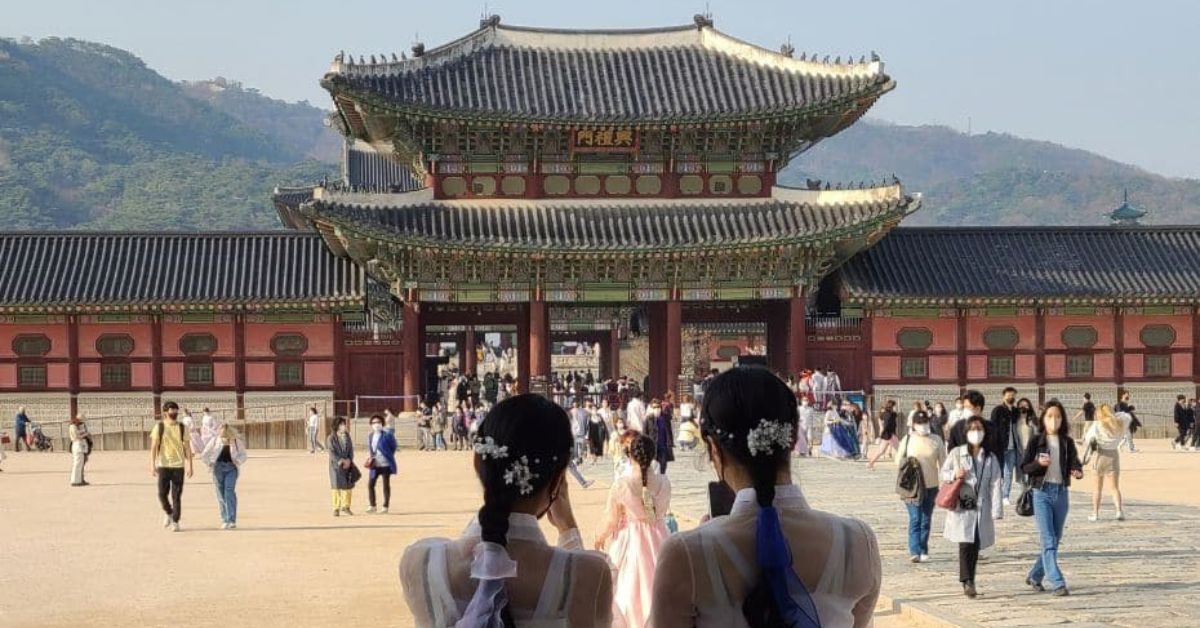If you’re planning to make the excellent choice to move to Korea one day, then you’ve probably asked yourself this question. Do you actually need to actually learn Korean to live in Korea? Can you survive day-to-day without being able to speak what is, arguably, a very different language to many other languages in the world. Well, the short answer is… yes.
Of course, there’s a lot more to it than that. Living in Korea as an expat and not knowing the language is definitely possible, but there are times when you’ll be left speechless and struggling.
Find out how far a basic knowledge of Korean will take you, as I show with examples from my own personal experience of living in Korea since 2015. Did I quickly learn Korean to live in Korea more easily? Ahem… Read on to find out the answer. You might also pick up a few basic Korean phrases and realise you know more Korean than you thought!
Affiliate Disclaimer: This site contains affiliate links and I may earn commission for purchases made after clicking these links.
Should You Learn Korean To Live In Korea?

Do you need to learn Korean to live in Korea?
No.
That’s my conclusion after living in Korea for 6 years and seeing plenty of other expats getting by just fine but not being able to hold a conversation in the local language.
Learning Korean will make your social life richer, increase job opportunities, and help you in so many situations.
Should you learn Korean to live in Korea?
Absolutely.
Learning Korean when you live in Korea will open up so many doors for you and make your social life richer, increase your job opportunities, and help you in so many day-to-day situations.
There are many situations where you’ll absolutely need to speak Korean or have a very kind Korean friend to help you.
At the very least you should know hangul (the Korean alphabet) and some basic Korean phrases if you want to travel to Korea or live here.
Whilst there are many reasons that you don’t have to learn Korean to live in Korea, there are also many situations where you’ll absolutely need to speak Korean or have a very kind Korean friend to help you. I’ll list some of these later on in this article.
Before I talk about why and how you should learn Korean to live in Korea now or in the future, I want to share my own story and my experience learning Korean in Korea.
Planning to visit Korea? These travel essentials will help you plan your trip, get the best deals, and save you time and money before and during your Korean adventure.
Visas & K-ETA: Some travellers to Korea need a Tourist Visa, but most can travel with a Korean Electronic Travel Authorisation (K-ETA). Currently 22 Countries don’t need either one.
How To Stay Connected: Pre-order a Korean Sim Card or a WiFi Router to collect on-arrival at Incheon Airport (desks open 24-hours). Alternatively, download a Korean eSIM for you travels.
Where To Stay: For Seoul, I recommend Myeongdong (convenient), Hongdae (cool culture) or Gangnam (shopping). For Busan, Haeundae (Beach) or Seomyeon (Downtown).
Incheon Airport To Seoul: Take the Airport Express (AREX) to Seoul Station or a Limo Bus across Seoul. Book an Incheon Airport Private Transfer and relax to or from the airport.
Korean Tour Operators: Tour companies that have a big presence in Korea include Klook, Trazy, Viator, and Get Your Guide. These sites offer discounted entry tickets for top attractions.
Seoul City Passes: Visit Seoul’s top attractions for free with a Discover Seoul Pass or Go City Seoul Pass. These passes are great for families and couples visiting Seoul – you can save lots.
How To Get Around: For public transport, grab a T-Money Card. Save money on Korea’s high speed trains with a Korea Rail Pass. To see more of Korea, there are many Rental Car Options.
Travel Money: Use money exchanges near Myeongdong and Hongdae subway stations for the best exchange rates. Order a Wise Card or WOWPASS to pay by card across Korea.
Flights To Korea: I use flight comparison sites such as Expedia and Skyscanner to find the best flights to Korea from any country. Air Asia is a good option for budget flights from Asia.
How To Learn Korean: The language course from 90 Day Korean or Korean Class 101 both have well-structured lessons and lots of useful resources to help you learn Korean.
Have I Learnt Korean While Living In Korea?

I’ll be honest, after 7 years of living in Korea, I haven’t learnt that much Korean. I can get by, but I’m not exactly comfortable holding a deep conversation in Korean.
When I moved to Korea in 2015, I started learning Korean quite enthusiastically. I was studying during breaks at work and attended evening classes twice a week. I also used some apps, such as Memrise, to help me practice reading and memorising Korean.
I managed to learn hangul (the Korean alphabet) before moving to Korea, and that was a really helpful first step. If you want to learn Korean to live in Korea, definitely start with this and move on to vocabulary and grammar afterwards.
I’m not exactly comfortable holding a deep conversation in Korean.
Regrettably, a couple of situations arose that derailed my Korean learning. Firstly, I started an online MA TESOL course to become a better teacher. This ate up a lot of my free time for several years.
Secondly, I had a long commute and the bus schedule moved back so that I couldn’t get to my evening classes in time and I had to stop them.
Thirdly, and perhaps most consequential, I started dating a wonderful Korean woman and ended up becoming lazy with my Korean practice, depending too much on my partner to help me with serious language issues.
I started dating… and ended up becoming lazy with my Korean practice…
Dating in Korea, I believe, can either spur you on to greater learning, or it can lead you into complacency and harm your language development. I’ll talk more about dating later on.
Even though I stopped actively learning Korean, I have still developed my Korean skills passively. This has helped my range of vocabulary increase, but hasn’t done much for my grammar.
It’s hard to live in Korea and not learn some Korean as you move around day to day. From signposts to song-lyrics, slogans to menus, you’re constantly exposed to Korean and some of that seeps into your brain and stays there.
So, do you need to learn Korean to live in Korea? Yes, you really do. I’ve been lucky enough to survive this long, but now I’m determined to refocus my efforts on learning Korean.
…you’re constantly exposed to Korean and some of that seeps into your brain and stays there.
After a busy year adapting to a new job working at a Korean university, as well as finishing my master’s degree (finally!), I’m ready to master Korean at last. Fighting!
My plan is to sign up for online classes through 90 Day Korean – a company I’ve worked with for a while now and would recommend. I’ve learnt through their free programmes before, but now plan to sign up for their premium, guided course to help me learn Korean more quickly.
I’ll be sure to write about my learning experience later on, so be sure to check back for future updates on my (hopefully) successful studies.
The next couple of sections should help you understand how you can live in Korea without learning Korean fully, as well as other situations where you’ll definitely need a Korean speaker to help you live life.
5 Reasons You Don’t Need To Learn Korean To Live In Korea

If you’ve ever visited another country and managed to book hotels, buy food, visit attractions, and travel on public transport without learning the local language, then you’re probably able to live in Korea without learning Korean.
Living in another country, be it Korea or elsewhere, is mostly the same as living in your own country. You will buy groceries, go to work, meet friends, travel around, watch TV, and wonder where all your money has gone each month.
There are so many things that we already know how to do… that are easy to transfer to living in another country.
If you know the basic idea of how to do these things, you can often do them without needing to know the language everyone is speaking around you.
Want to buy fruit from a supermarket? Pick it up and put it in your basket. Want to drink coffee in a cafe? Point at what you want, pay, sit down, and enjoy it. Need to get a haircut? Well… shave your head like I do, it’s easier.
There are so many things that we already know how to do through our life in our homelands that are easy to transfer to living in another country.
In regards to life in Korea, here are 5 good reasons why you don’t need to learn Korean to live in Korea. This also applies to people who want to travel to Korea.
1: There Are Many English Speakers In Korea
You might not know it if you walked around Seoul, but a lot of people can actually speak English at quite a good level.
If you need help, you can often try asking in English and you’ll likely manage to communicate even if you don’t know much Korean.
English is a required subject at school, and many Korean students start learning it from elementary school or before.
As an English teacher, I certainly know that the level of English varies a lot, but most people under the age of 40 will have had several years of exposure to English education.
They’ll also have a whole lifetime of exposure to English words in their everyday life, as you’ll see in the next point.
2: English Translations Are Common

English is literally everywhere in Korea. Shop signs, signposts, adverts, packaging, clothing, menus, train announcements, and many other places. You’ll find English wherever you go.
You’ll actually find more English than Korean in some places. Look around a pharmacy or supermarket and there are so many English brand names and descriptions, it makes me wonder how Korean people know what they’re buying.
Unfortunately, the English used in some places isn’t always…accurate. This results in ‘Konglish‘, which makes for some very Funny Konglish Pictures as you explore Korea.
3: Many Korean Words Are ‘Borrowed’ From English

Not only can you see many signs in English, there are a lot of cognates – loan words – from English that make it easier to learn and speak Korean.
There are hundreds of words in Korean that are based on English. For example, you can already say these words in Korean:
- computer
컴퓨터 (kom-pyu-ta) - Ice cream
아이스크림 (a-i-su-ku-rim) - Taxi
텍시 (tek-shi) - McDonald’s
맥도날드스 (Mek-do-nal-du-su) - Coffee
커피 (ko-pi)
That’s why learning hangul (Korean alphabet) is really, really helpful if you want to visit or live in Korea.
It’ll help you decipher all of these loan words and you’ll be ordering 피자 (pi-ja) and 콜라 (ko-ra) for dinner with ease.
4: You Can Use Translation Apps In Most Situations
When I visited Beijing in 2017, I didn’t speak a word Mandarin, yet managed to book tours, eat out, and give directions to a taxi driver. Thanks to apps like Kakao Taxi, you can order taxis in Korea without a Korean phone number and without speaking English.
Translation apps such as Google Translate and Papago, whilst still far from perfect, are getting better at bridging the language gap. I would recommend using Papago for Korean translation as it is better suited to translating Korean and I’ve found it’s the best Korean translation app.
Translation apps… are probably the reason my Korean isn’t good.
Not sure what the word for plastic bag is while you’re shopping? Tap it into the translation app. Want to explain that you have a headache at the clinic? Type it in English and show it to the receptionist so they can read it in Korean.
Translation apps have helped me countless times and are probably the main reason my Korean isn’t as good as my Japanese (which I learnt whilst living in Japan for 3 years) – they weren’t as common when I lived there.
As a tourist or expat, make sure you have access to one wherever you go.
5: You Can Get By With Only Basic Korean Phrases

Once you’ve mastered the basics of a language, it’s amazing how much you can do. As an English teacher, I always remind my students that. And as an expat in Korea who has survived on the basics for so long, I can definitely confirm it.
Phrases such as these can be used in countless situations:
- How much is this?
- Where is ~?
- I’m sorry, I don’t know.
- Do you speak English?
Sign language and gesturing is also an important part of communication and can take the place of grammar or vocabulary that you’ve not got around to learning.
For example, if you enter a shop and want to know how much something is, you can point to it and ask 얼마예요? (ol-ma-yeh-yo) – how much is it? You don’t need to know the word of the thing you’re asking about.
Always mind your P’s and Q’s first when learning a language, as I was taught as a kid. For those that don’t know that expression, it means to mind your manners.
Basically, learn to say please and thank you – something you’ll need to live in Korea happily.
Check out my guide to Basic Korean Phrases that’ll help you shop, eat out, travel, and be polite when visiting Korea. An essential list of the most useful phrases.
5 Times When You’ll Need Help With Korean

Although you can live in Korea with basic Korean, there are certainly times when you’ll need a marvellous person to help you navigate the pitfalls of linguistic ignorance.
These are 5 situations that I’ve experienced while living in Korea where I needed help. There are definitely more instances than this, but these should give you a good enough idea of why you should learn Korean to live in Korea.
1: When Filling In Documents
Reading and writing are two very different skills, just as listening and speaking are. This is the difference between receptive (taking in) and productive (putting out) language skills and most people find it easier to take in than put out.
So when it comes to having to fill in a document at a bank, hospital, immigration office, or similar place, a knowledge of Korean is invaluable.
Hangul isn’t hard to learn to read and write, but knowing what to write and how to write are also very different and when faced with a block of Korean text with many instructions. It’s easy to panic.
2: When Doing Your Tax Returns
Taxes aren’t a lot of fun in any country. Try doing them in another country and in another language!
I’ve got to say, the Korean tax system is incredibly convenient thanks to a centralised system that links your bank account, phone number, and tax records into one so you can download all your relevant tax information with the push of a button.
You really don’t want to mess up something as important as a tax return…
Claiming exemptions, filling in forms, knowing where to sign, working out if your tax is correct, and many other aspects of the process, however, are not as fun.
You really don’t want to mess up something as important as a tax return, especially if it costs you money in the end.
So either learn Korean or pay for an accountant who can do it for you. Or, beg the lovely people you work with to help you out, as I do.
3: If You Start Dating A Korean Person

As mentioned before, one of the reasons I didn’t get around to continuing my Korean studies was because I was lucky enough to start dating my amazing Korean girlfriend.
If your partner speaks both your native language and Korean, dating can take away the urgent need to learn Korean. Especially if your partner is kind enough to help you do those tricky language-dependent things you can’t yet do.
Of course, the opposite is also true – it’ll increase your need to learn Korean. Romance without true communication can lead to many problems and miscommunication is a big issue for couples who speak different native languages.
And then there’s the family in law. You’d best learn some super-polite Korean expressions when speaking to your parents-in-law or you’ll never be invited to the family celebrations!
For more (not so serious) issues you might find dating in Korea, check out my article about the Dangers Of Dating In Korea.
4: When You Have A Serious Medical Need

There’s nothing worse than being sick in a foreign country and not knowing how to ask for help. You either need to rely on the kindness of strangers or friends, or you need to be able to explain what’s wrong by yourself.
Booking medical appointments and checkups can also be difficult without a good level of Korean, as I rediscovered when I was vaccinated in Korea.
For most minor trips to see a doctor, however, you can often get away with basic Korean skills and a translation app.
Doctors and nurses have to study English as part of their studies at medical school and should be able to communicate with you about basic medical problems. That doesn’t mean they can speak English, however.
5: If You Get In Trouble
I really hope this doesn’t happen to you, but can you imagine getting arrested in another country and not being able to speak the language.
This hasn’t happened to me in Korea (yet), but I’ve had run-ins with the police in other countries (in Japan for riding with earphones in). Not being able to understand what’s happening can be frightening and, worse yet, can lead you into more trouble.
I don’t recommend breaking the law any time soon. Why not learn Korean instead? It’s probably going to be better in the long run.
The next section will give you a few ideas about how to do that.
How Can I Learn Korean While Living In Korea

There are countless ways to learn Korean. I’d recommend trying a few different ones and see what works best for you. Different people learn in different ways, but the truth about language development is that you have to be consistent and work hard.
To learn Korean, I would recommend these methods:
Korean Language Apps
Learning Korean doesn’t need to take up hours each day. If want to learn Korean living in Korea, or in other countries, you can do it while you ride the bus, sit on the toilet, or have a snack. Apps such as Memrise, Duolingo, KORLINK, and many others can help you learn at your own pace. These are great for learning to read hangul, too.
Online Courses
Courses, such as the one by 90-Day Korean, can guide you through the language learning experience. Start with the basics and progress through the levels until you are ready for real-life conversation. Of course, you should try to get a mix of online and offline learning for the best results. Another online courses that I’d recommend is Talk To Me In Korean.
Language Classes
If you live in a big city in Korea, there’s probably a community-based language course where you can learn Korean for a low price (or free). Check out your local government’s website to find one.
You can also sign up for Korean classes at universities in Korea and study for a month or more. This’ll help you learn Korean quickly. If you’re not sure if you need to learn Korean to live in Korea, then a language exchange like this can help you know for sure.
Language Exchanges
There are plenty of language exchange groups on Facebook. Chat in Korean and then chat in English. Mix with locals and some of the 2,000,000+ Foreigners Living In Korea and develop your own skills as you help others learn your own language. These aren’t just for English-Korean exchanges, they often include other languages, too.
Private Tuition
If you can afford it, find someone to give you one-to-one lessons at least once or twice a week. This will help people with low confidence to speak in public, people who need a tailored course, and people who like to ask lots of questions as they learn.
Practice Speaking When Possible
Talk. Talk to friends, talk to co-workers, chat with the ajumma at the market, practice using Korean in any situation you can. If you want to learn Korean to live in Korea, then using it in your daily life is the most useful way to practice.
What’s It Like Living In Korea As An Expat?
Expat Life In Korea Guide: If you’re thinking about moving to Korea, or want to know what life is like as an expat in Korea, then you should check out my guide to expat life in Korea.
It talks about what’s good (and not so easy) about living in Korea, as well as how to survive and thrive in the Land of the Morning Calm.
My EPIK Life In Korea: If you’d like to know more about my life in Korea as an English teacher, then you might enjoy this article.
FAQ About Learning Korean In Korea
Finally, here’s a few FAQs about whether you should learn Korean to live in Korea, in case the above information didn’t cover enough for you.
Do I need to learn Korean to live in Korea?
No. You can get by as an expat in Korea with a basic level of Korean for 90% of the time. However, there will definitely be times when you need the help of a Korean speaker, such as when filing taxes, booking appointments, or when dealing with the authorities.
Do people in Korea speak English?
Some do, yes. Whilst English isn’t technically a second language, it is compulsory in all levels of public school education starting from elementary school. It’s also a required subject for Korean high school students when studying for the final exams before entry to university.
Can I learn Korean in Korea?
Yes. There are many ways to learn Korean when you live in Korea. Public language courses provided by local governments, tuition-based language courses, local language exchanges, and private courses are some of the most popular methods, as well as online and app-based language programmes.
Is it mandatory to learn Korean to live in Korea?
No. There is no mandatory requirement to learn Korean to live in Korea, but it will certainly help you to adjust to life in Korea. If you intend to apply for a residency visa, then learning Korean will help you improve your overall score and chance of living in Korea.






Great article! Thank you. Hope you can tell us more on: food, culture, local holidays. I hope to live there too one day:).
Thanks, I certainly hope to share a lot more soon 🙂 You should definitely try living in Korea, it’s great.
It’s excellent explanation about korean language culture and studying korean, we are getting knowledgeable information from here. Loving to join korean studying.
Thank you 🙏
Thanks, glad you enjoyed it.